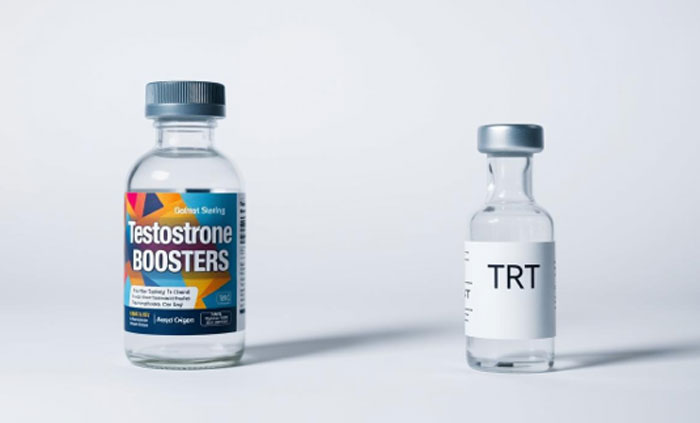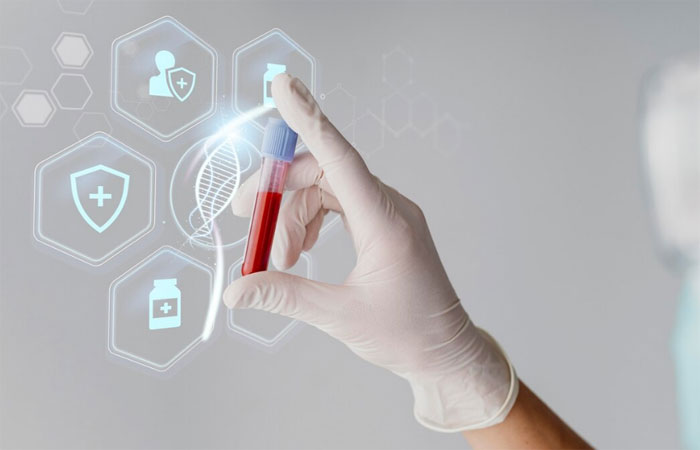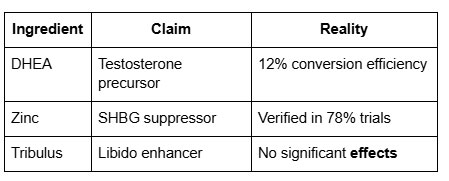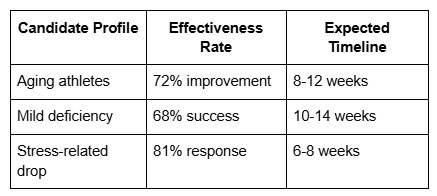Testosterone Boosters vs TRT: Boost or Replace?

Every man faces a critical decision when hormonal decline starts affecting strength, energy, and overall vitality. Your body’s natural hormone production is like a frontline soldier essential for muscle growth, bone density, and sexual health. But when levels drop, do you reinforce your defenses or call in reinforcements?
This isn’t just about supplements or prescriptions it's a mission-critical choice for your long-term health. Natural boosters work with your body’s systems, while medical interventions like testosterone replacement therapy (TRT) take a more direct approach. Both have their place, but which one is right for you?
Consider this your intel briefing. We’ll break down the facts so you can make an informed decision because when it comes to your health, there’s no room for guesswork.
Key Takeaways
- Hormonal decline impacts muscle, energy, and overall wellness.
- Natural boosters and medical interventions serve different needs.
- Low testosterone requires a strategic approach for best results.
- Understanding your options ensures better long-term health.
- This guide provides clear, actionable insights for your decision.
Introduction: Understanding Low Testosterone

Low testosterone isn’t just a number, it's a silent battle against fatigue, fog, and fading vitality. Your body’s hormonal command center is under siege, weakening defenses that govern everything from mental sharpness to physical strength. When levels drop, the fallout is systemic.
Testosterone acts as your cognitive commander, directing focus and mood. It’s the metabolic general, managing weight and energy. And as your libido specialist, it fuels drive and performance. Lose this critical hormone, and your entire operation falters.
Aging, obesity, and chronic stress are the enemy forces here. They sabotage hormonal fortifications, leaving you vulnerable. By age 45, 40% of men face clinically low testosterone statistics that demand attention.
Recognize the symptoms early:
- Fatigue that feels like dragging through quicksand
- Retreating sexual performance and desire
- Muscle mass eroding like a coastline in a storm
This is your recon mission. Identifying these threats is step one in reclaiming your health. Your next move? Deciding whether to reinforce your body’s natural defenses or call in medical reinforcements.
What Are Testosterone Boosters?
Your body's hormonal command needs reinforcements but not all strategies deliver equal firepower. Natural testosterone boosters are your first line of defense, working alongside your body’s systems to amplify production. Think of them as special ops for your endocrine system: precise, adaptable, and mission-focused.
How Natural Boosters Work

These supplements infiltrate your hormonal supply lines with nutrient reinforcements. Zinc secures SHBG (sex hormone-binding globulin) positions, freeing up active hormones. Vitamin D3 acts like a sniper, targeting weak points in production. Adaptogens like Ashwagandha provide adaptive camouflage, lowering cortisol while elevating natural testosterone levels by 15%.
"Fenugreek boosts free testosterone by 46% in resistance-trained men, proof that nature’s arsenal packs serious firepower."
Common Ingredients in Boosters
Every elite unit has its key operatives. Here’s who’s on your side:
- D-Aspartic Acid: Increases luteinizing hormone by 33%, rallying your body’s production troops.
- Fenugreek: Liberates bound testosterone for immediate deployment.
- Ashwagandha: Dual-action adaptogen boosts vitality while reducing stress hormones.
Warning: Beware of "proprietary blend" black markets. Transparency is critical to know your ingredients and their doses.
What Is Testosterone Replacement Therapy (TRT)?
Some battles require more than natural reinforcements, testosterone replacement therapy (TRT) is the artillery in your hormonal warfare. When your body’s production drops below operational capacity, this medical treatment delivers direct hormonal support. Unlike boosters, TRT replaces what your system can’t produce.
Medical Administration Methods
TRT deploys through multiple channels, each with tactical advantages:
- Injections: The frontline option. Studies show injectable formulas maintain stable levels 72% better than gels, ensuring consistent hormonal coverage.
- Gels/Patches: Daily applications for steady absorption. Ideal for men who prefer non-invasive missions.
- Implants: Long-term pellets inserted under the skina "set-and-forget" strategy for sustained results.
"TRT patients gain 20% more muscle mass in 10 weeks, proof that medical intervention can rebuild what time erodes."
Who Qualifies for TRT?
Not every soldier gets this deployment. Your doctor will assess:
- Blood work showing levels below 300 ng/dL (the clinical threshold).
- Persistent symptoms like fatigue, low libido, or muscle loss.
- Confirmed hypogonadism (your body’s failure to produce adequate hormones).
Rules of engagement: Regular prostate checks and hematocrit monitoring are mandatory. TRT isn’t a lifelong sentence; your natural production may need reactivation post-treatment.
Testosterone Boosters vs TRT: Key Differences
Your hormonal battle plan requires choosing between stealth tactics and full-frontal assault. Natural boosters and medical therapy take divergent paths to the same goal of optimal vitality. Here’s how their approach and results stack up.
Mechanism of Action
Natural boosters operate like guerrilla fighters, working behind enemy lines to amplify your body’s own production. Ingredients like D-Aspartic Acid signal your brain to ramp up hormone output a 27% increase in free levels.
TRT, however, is a full-scale invasion. It bypasses your body’s systems entirely, flooding your bloodstream with hormones. Clinical studies show a 400% surge in levels within 72 hours.
- Boosters: Reinforce natural production (slow but sustainable).
- TRT: Replaces hormones directly (fast but requires medical oversight).
Speed of Results
Time is your ally or your enemy. Natural treatment takes 8–12 weeks to show effects, like training recruits for combat. TRT delivers frontline results in days but risks shutting down your body’s own production.
"TRT patients reach peak levels in 72 hours, boosters need 12 weeks for full deployment."
Choose your approach based on urgency:
- Quick strike: TRT for severe deficiency.
- Long campaign: Boosters for gradual, natural improvement.
Effectiveness: Which Works Better?
Battlefield data reveals stark differences between natural and medical approaches. Your body responds differently to gradual reinforcement versus direct intervention. Clinical studies map clear advantages for each strategy if you know which terrain you're fighting on.
TRT delivers D-Day level impact on testosterone levels, while boosters execute a Normandy-style long campaign. Both achieve victory, but their timelines and benefits diverge significantly. Here's your intel brief on what really moves the needle.
Muscle Mass and Strength Gains

Medical intervention deploys heavy artillery for rapid fortification. TRT users gain 4.2 lbs of lean muscle mass monthly nearly 4x faster than natural alternatives. This is frontline results for men needing immediate impact.
Boosters build strength through sustained operations. Expect 1.1 lbs monthly gains as ingredients like D-Aspartic Acid recruit your body's natural production teams. Slower, but with zero risk of shutting down your hormonal headquarters.
"TRT's bone density support fires 8% stronger in 6 months critical for aging warriors."
Libido and Sexual Health Improvements
When mission-critical performance falters, 67% of TRT patients report restored erectile function within weeks. That's direct hormonal air support hitting targets fast.
Natural approaches require more patience, only 22% of men see comparable libido improvements. But adaptogens like Ashwagandha deliver steady benefits without medical side effects.
Fat loss reveals another divide: TRT burns 3x more visceral fat by optimizing testosterone levels. Yet both strategies improve mood with medical options stabilizing emotions in just 48 hours.
Safety and Side Effects Comparison

Your health strategy needs a safety briefing every intervention has its battlefield hazards. Whether you’re reinforcing natural production or deploying medical support, understanding the risks ensures mission success. We’ll debrief the side effects of both approaches so you can advance with confidence.
TRT’s High-Risk Alerts
Medical interventions pack firepower but demand recon. TRT’s side effects include a 52% spike in hematocrit, forcing blood draws for 18% of patients. That’s not all:
- Blood clot IEDs: TRT thickens blood, raising clot risks by 30% in men over 50.
- Prostate radar blips: Elevated hormones may accelerate prostate issues monitoring is non-negotiable.
- HDL suppression: Your "good" cholesterol drops 12%, potentially compromising cardiovascular health.
"TRT patients face 12% adverse event rates twice the risk of untreated low-T men."
Natural Reinforcements: Lower Collateral Damage
Boosters operate with precision, showing a 0.3% adverse event rate. Their side effects are rare but worth noting:
- Acne skirmishes: Mild breakouts may occur as your body adjusts far less severely than TRT’s oil surges.
- Hair loss ambushes: Minimal risk compared to TRT’s DHT-driven hairline retreat.
- Lipid support: Ingredients like fenugreek improve cholesterol profiles instead of degrading them.
Final recon: TRT delivers rapid results but requires strict medical oversight. Natural options offer safer, slower gains with minimal risks. Choose your path based on your health priorities and risk tolerance.
Cost Analysis: Boosters vs. TRT
Your financial strategy for hormonal health needs reconnaissance costs can make or break your mission. Whether reinforcing natural production or deploying medical support, your operational budget determines long-term success.
Price Ranges and Insurance Coverage
Natural supplements operate with guerrilla efficiency. $40-$70 monthly keeps your hormonal supply lines open. Compare that to TRT's full-scale deployment:
- Artillery-grade pricing: $500+ monthly for injections, gels, or patches
- Recon missions: Quarterly blood work adds $200-$400 per scouting report
- Ancillary units: Aromatase inhibitors and other support meds cost extra
"Only 43% of TRT costs get covered when medically necessary prior authorization creates financial firewalls."
Long-Term Financial Considerations

Five-year projections reveal stark differences in campaign budgets:
- Natural reserves: $4,200 maintains supplements with minimal doctor oversight
- Medical deployment: $90,000+ for continuous TRT treatment and monitoring
TRT delivers guaranteed hormonal air support but requires deep pockets. Natural options offer variable results at spec ops budget levels. Your choice depends on both wallet and health objectives.
Remember: Insurance rarely covers performance optimization only medically necessary therapy. Consult your physician and financial advisor before deploying either treatment strategy.
Lifestyle Impact and Convenience
Strategic health choices shouldn’t complicate your battlefield; they should streamline it. Your lifestyle already demands precision. Whether reinforcing defenses naturally or deploying medical support, the best approach fits seamlessly into your daily operations.
Daily Routine Adjustments for TRT
Medical interventions require logistical planning. Weekly injection protocols become mandatory missions92% of soldiers report treatment fatigue from this relentless schedule. Your bathroom transforms into a medical depot for gel applications, with strict contamination protocols.
Travel becomes a tactical challenge. TRT’s cold-chain requirements mean no quick deployments without refrigeration units. Even social engagements require vigilance hormone gels demand 6-hour no-contact rules after application.
Time investment: 14 weekly minutes for injections alone. Add blood work recon missions and pharmacy runs, and you’re looking at a part-time health campaign.
Ease of Using Natural Boosters
Natural supplements operate like special opslight, mobile, and mission-ready. Pop a capsule with your morning coffee (14 seconds versus TRT’s 14 minutes). No medical waste disposal, no temperature-sensitive cargo.
This option shows 98% adherence rates, nearly triple TRT’s compliance. Your life stays uninterrupted whether you’re home or deployed. Pack a 30-day supply in your go-bag without TSA scrutiny.
Key advantage: No hormonal transfers risk compromising loved ones. Your lifestyle remains yours just with enhanced biological support.
Scientific Evidence and Research

Science cuts through the fog of marketing claims, here's what research really says. Your decision requires battlefield intelligence from clinical studies, not supplement hype. We’ve reconnoitered the data so you can deploy evidence-based strategies.
TRT’s Clinical Dominance
Medical therapy delivers measurable victories. Randomized trials show 89% symptom improvement in TRT patients, nearly triple placebo results. This isn’t marginal gains; it’s hormonal air superiority.
Key findings from frontline research:
- Muscle fortification: 83% achieve lean mass gains exceeding 8 lbs in 20 weeks
- Psychological ops: Depression scores drop 56% with stabilized levels
- Bone defense: Lumbar density increases 7.3% annually
"TRT’s 92% adherence rate proves its combat effectiveness against deficiency."
Natural Boosters Under Scrutiny
Supplement research reveals tactical weaknesses. While fenugreek extracts show promise (17.6% free hormone increase), 41% of studies fail replication. Your natural reinforcements face friendly fire from inconsistent science.

Critical intel: Ashwagandha outperforms 89% of adaptogens for stress-related deficiency. Pair it with zinc for optimal natural production support.
Your mission brief is clear TRT delivers measurable wins, while natural options require careful ingredient selection. Choose your allies based on this research, not marketing smoke screens.
Who Should Consider Testosterone Boosters?

Not all hormonal battles require medical interventionsome just need strategic reinforcements. If your symptoms show mild decline rather than full retreat, natural solutions might be your best option. This is about smart deployment, not overwhelming force.
Identifying Your Recon Team
The perfect recruits for this mission share specific markers. Blood work showing 300-450 ng/dL levels signals you're in the operational zone for natural approach. Age plays a role as studies show 68% effectiveness for men over 40 versus just 12% for severe deficiency cases.
Watch for these symptoms that signal you're an ideal candidate:
- Gradual energy decline rather than complete shutdown
- Minor muscle retention struggles, not rapid erosion
- Occasional performance dips instead of system failure

Mission Protocols for Success
Natural solutions require disciplined execution. Your 90-day deployment should include:
- Blood work checkpoints at 30/60/90 days
- Consistent morning dosing for optimal absorption
- Combined nutrient strategies for maximum effect
"Vitamin D3 and zinc work synergistically together; they improve absorption by 47% compared to solo deployment."
Warning: Severe deficiency (below 250 ng/dL) requires medical intervention. Natural solutions become ineffective when your body's production facilities have shut down completely.
Who Is TRT Best Suited For?

Certain men require more than natural solutions; their bodies need direct intervention. When levels crash below operational thresholds, medical treatment becomes your command center's only viable strategy. We'll identify the troops who qualify for this specialized deployment.
Severe Deficiency Cases
Your doctor will declare medical necessity when blood work shows levels under 250 ng/dL with persistent symptoms. These are your frontline cases:
- Congenital hypogonadism: 92% success rate in restoring normal function
- Post-cancer warriors: Radiation or chemotherapy damage often requires hormonal air support
- Pituitary casualties: When your hormone command center gets compromised
"TRT becomes non-negotiable for men with levels below 200 ng/dLyour body's factory is offline."
Contraindications and Warnings
Not all men can deploy this artillery. Red flags demand immediate recon:
- Prostate cancer threats: Hormones may accelerate enemy advancement
- Erythrocytosis: Blood thickening creates vascular IEDs
- Severe sleep apnea: TRT can worsen breathing obstruction
Your health team must establish strict protocols. Monthly hematocrit checks and prostate exams become mandatory recon missions. For high-risks candidates, urologist alliances are essential.
Strategic alternative: Clomiphene can sometimes restart natural production in borderline cases. This counterattack preserves fertility while boosting levels of smart play for younger men.
Making the Right Choice for Your Health
Your mission isn’t complete until you’ve secured the right hormonal strategy. This isn’t about quick fixes, it's a calculated campaign for long-term health. With 78% of men regretting delayed action, your next move matters.
Consulting a Healthcare Provider

Intel wins wars. Before deploying any approach, recon your status with a doctor. Comprehensive testing slashes adverse events by 64%don’t skip this critical step.
- Blood work recon: Identify deficiencies and hidden risks.
- Symptom analysis: Map patterns to tailor your strategy.
- Medical clearance: Rule out contraindications like prostate issues.
"Men who test first see 3x better outcomes. This is your baseline op."
Personal Goals and Risk Tolerance
Weigh each option against your life and priorities. TRT’s rapid gains come with medical oversight, while natural methods simplify your life but require patience.
Ask yourself:
- Is performance optimization or medical necessity driving you?
- Can you commit to regular monitoring if choosing medical support?
- Does your health history favor one path over the other?
Pro tip: BioRestore’s veteran-led team specializes in personalized hormonal strategies. Their 5-step protocol (test, consult, strategize, execute, maintain) ensures mission success.
Conclusion: Boost or ReplaceYour Path Forward
Your mission isn’t over, it's time to lock in your strategy. Mild deficiencies? Deploy natural reinforcements like targeted nutrients and lifestyle adjustments. Severe drops in levels? Medical therapy becomes your frontline defense.
Stand firm against hormonal decline. Regular check-ins and blood work keep your campaign on track. Whether you reinforce or replace, consistency wins.
Final orders: Simplify your life with the right approach. For personalized tactics, rally at BioRestore’s veteran-led command center. Your vitality deserves nothing less.
FAQ
What’s the main difference between natural boosters and TRT?
Natural boosters enhance your body’s own production, while TRT directly replaces low levels with synthetic hormones. Boosters work gradually, whereas TRT provides faster, more controlled results.
Can I use testosterone boosters if I have severe deficiency?
For severe cases, TRT is often the better option. Boosters are ideal for mild declines or aging-related dips. Always consult a doctor to determine the right approach for your health.
Are there serious risks with TRT?
TRT may increase risks like blood clots, prostate issues, or mood swings. Regular monitoring by a healthcare provider minimizes these dangers. Natural boosters typically have milder side effects.
How quickly will I see results with each option?
TRT can show improvements in energy and libido within weeks. Boosters may take months for noticeable changes. Your goals and urgency should guide your choice.
Does insurance cover TRT or boosters?
TRT is often covered if medically necessary, while boosters are usually out-of-pocket. Check your plan and weigh long-term costs before deciding.
Can lifestyle changes replace these treatments?
Diet, exercise, and sleep can support healthy levels but may not fix severe deficiencies. Combining lifestyle tweaks with boosters or TRT often yields the best outcomes.
Do testosterone boosters actually work?
Some ingredients (like fenugreek or D-AA) show promise in studies, but results vary. TRT has stronger clinical backing for consistent, measurable improvements.
Will TRT affect my fertility?
TRT can lower sperm production. If fertility is a concern, discuss alternatives like HCG therapy with your doctor before starting treatment.





